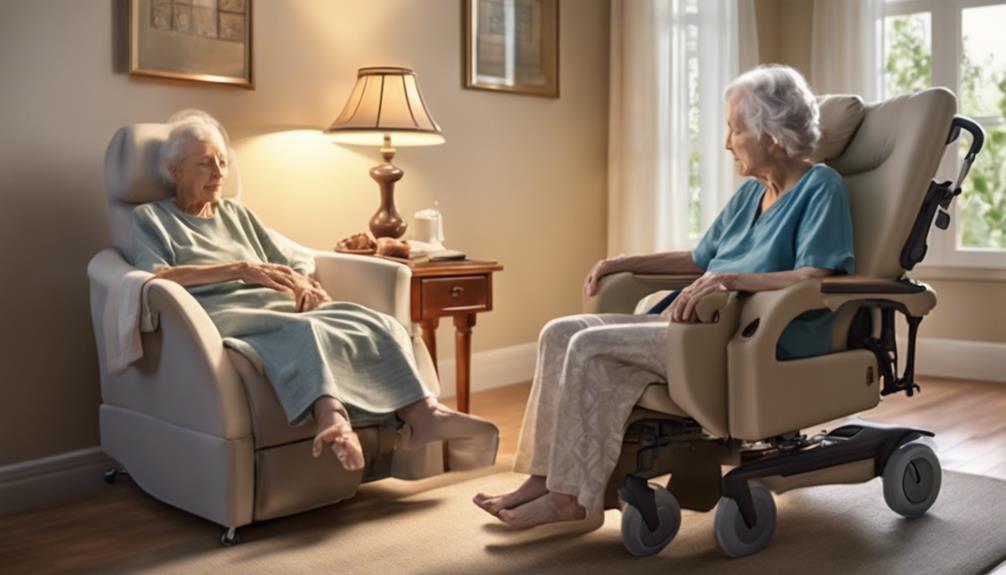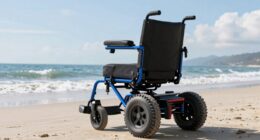As you start the challenging task of determining if a patient with dementia is ready for hospice care, it can feel like deciphering a mysterious message in a foreign language. You may contemplate the subtle changes in behavior, the gradual loss of cognitive skills, and the growing dependence on others for help.
But how do you truly know when the time is right to consider hospice care for a loved one battling dementia? Let's explore the nuanced signs and pivotal considerations that can guide this delicate decision-making process.
Key Takeaways
- Decline in basic daily tasks, weight loss, and dependence signal readiness.
- Monitoring nutritional status and addressing decline promptly are crucial indicators.
- Co-morbid conditions complicate care and impact hospice eligibility.
- Hospice offers tailored end-of-life support, symptom management, and respite care options.
Recognizing Signs of Decline
If you notice a loved one with dementia struggling to perform basic daily tasks like dressing or bathing independently, it might be a sign that they're ready for hospice care. Dementia patients often experience a decline in functional abilities, indicating a need for specialized care.
Weight loss and impaired nutritional status, such as difficulty swallowing or malnutrition, are crucial factors to consider when evaluating hospice readiness in dementia patients. Additionally, the presence of terminal illnesses like aspiration pneumonia or septicemia, along with co-morbid conditions such as congestive heart disease or diabetes, can further complicate their health status.
Dependence on assistance for daily activities, recurrent hospitalizations, and incontinence are red flags that suggest the need for hospice support. Understanding these signs of decline in dementia patients can help caregivers make informed decisions about transitioning their loved ones to hospice care, ensuring they receive the appropriate level of attention and comfort during this challenging time.
Assessing Functional Abilities

Assessing functional abilities in dementia patients involves evaluating their independence in daily tasks like dressing, bathing, and mobility, which are key indicators of their readiness for hospice care. Understanding their ability to perform these activities of daily living can provide insights into the progression of their cognitive decline and physical limitations.
Here are some crucial points to consider:
- Witnessing a decline in their communication abilities can be distressing for both the patient and their loved ones.
- Struggling to manage personal care tasks can lead to a loss of dignity and autonomy.
- Dependence on others for basic activities can impact the patient's sense of self-worth and identity.
- Recognizing when the patient needs hospice services based on their functional decline requires sensitivity and compassion.
Evaluating Nutritional Status
Evaluating the nutritional status of dementia patients is crucial for ensuring their overall health and quality of life. In these individuals, indicators such as weight loss, refusal to eat, or signs of protein calorie malnutrition like low BMI or Albumin levels can signal impaired nutritional status.
Even when artificial nutritional support is provided, continued weight loss may indicate a decline in nutritional well-being. Regular monitoring for signs of malnutrition, especially in those with dementia who may have difficulty communicating their needs, is essential.
Addressing impaired nutritional status promptly is vital for maintaining their health and improving their quality of life. By staying vigilant and responsive to changes in eating habits or weight, caregivers can help prevent further decline in nutritional health and support the overall well-being of dementia patients.
Considering Co-morbid Conditions

Understanding the impact of co-morbid conditions on the health of dementia patients is essential for providing comprehensive and effective care. When managing conditions such as congestive heart disease, COPD, diabetes, and malignancy alongside dementia care, it's crucial to consider the following:
- Complexity of Care: Co-morbid conditions can complicate treatment strategies for dementia patients, requiring a holistic approach to address all health concerns effectively.
- Patient Outcomes: Coordinated care that accounts for both dementia and co-morbid conditions can significantly impact patient outcomes, enhancing their quality of life and comfort.
- Hospice Eligibility: The presence and management of co-morbid conditions play a vital role in determining a dementia patient's readiness for hospice care, ensuring appropriate support at end-stage Alzheimer's disease.
- Health Complications: Unmanaged co-morbid conditions can lead to severe health complications in dementia patients, necessitating proactive and attentive medical intervention for optimal well-being.
Understanding Hospice Care Options
Consider the range of hospice care options available to provide compassionate support for dementia patients in their end-of-life journey. Hospice care for Alzheimer's or dementia patients focuses on enhancing quality of life and ensuring comfort in the end-stage of the disease. Family caregivers often face immense challenges as the patient's condition deteriorates, making it essential to explore hospice services tailored to meet their needs. Here is a table outlining some key factors to understand about hospice care options for dementia patients:
| Hospice Care Options | Description | Coverage Options |
|---|---|---|
| Respite Care | Offers short breaks for family caregivers while ensuring patient comfort and quality of life. | Medicaid, Medicare, Private Insurance |
| End-of-Life Support | Specialized care to simplify the caregiving process and provide comprehensive support for patients with advanced dementia. | Medicaid, Medicare, Private Insurance |
| Comfort and Care | Focuses on managing symptoms, pain relief, and emotional support to improve the patient's well-being. | Medicaid, Medicare, Private Insurance |
Understanding these hospice care options can help you navigate the challenging journey of caring for a loved one with dementia, ensuring they receive the support they need while considering available coverage through programs like Medicaid, Medicare, or private insurance.
Frequently Asked Questions
What Are the Signs That a Dementia Patient Is Near Death?
When a dementia patient is nearing the end of life, signs like irregular breathing, reduced responsiveness, increased sleeping, and changes in skin color may appear. They might've difficulty waking up, eat or drink less, and display signs of agitation or distress.
These indicators can help you recognize that the end is near. It's important to stay attentive and provide comfort during this challenging time.
How Long Does Final Stage of Dementia Last?
In the final stage of dementia, the duration varies, lasting from a few weeks to several years based on health and disease progression. This stage can involve a rapid decline in both cognitive and physical abilities.
Individuals may become bedridden, lose the ability to communicate, and need constant care. Severe cognitive impairment, memory loss, and a decline in quality of life are common.
Hospice may be considered when life expectancy is around six months or less.
What Is the Life Expectancy of a Person With Dementia in Hospice?
When someone with dementia enters hospice, their life expectancy is often six months or less due to the advanced stage of the disease.
It's a time where comfort and support take center stage, focusing on managing symptoms and enhancing quality of life.
Hospice care offers a compassionate approach to help both patients and families navigate this challenging journey with dignity and care.
What Stage of Dementia Is Sundowning?
In the middle to late stages of dementia, sundowning occurs. It brings increased confusion, agitation, and restlessness in the late afternoon or early evening. This phenomenon disrupts sleep patterns and can lead to challenging behaviors like wandering.
Though the exact cause isn't fully understood, it may relate to changes in the brain's internal clock or sensory processing. Managing sundowning involves creating a calming evening routine, ensuring proper lighting, and addressing medical or environmental factors.
Conclusion
You may be hesitant to consider hospice for your loved one with dementia, but remember that it's about providing the best possible care and comfort during this difficult time.
By recognizing the signs of decline, assessing their needs, and understanding the benefits of hospice care, you can ensure that they receive the support and compassion they deserve.
Trust in the expertise of hospice providers to guide you through this journey with care and understanding.









